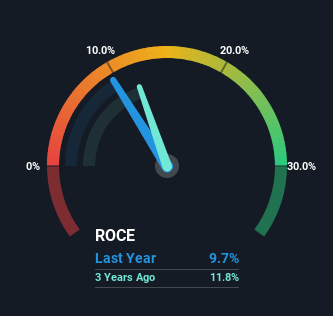Stock Analysis
Be Wary Of Tamilnadu Petroproducts (NSE:TNPETRO) And Its Returns On Capital

If we want to find a stock that could multiply over the long term, what are the underlying trends we should look for? Ideally, a business will show two trends; firstly a growing return on capital employed (ROCE) and secondly, an increasing amount of capital employed. If you see this, it typically means it's a company with a great business model and plenty of profitable reinvestment opportunities. Although, when we looked at Tamilnadu Petroproducts (NSE:TNPETRO), it didn't seem to tick all of these boxes.
Return On Capital Employed (ROCE): What Is It?
For those who don't know, ROCE is a measure of a company's yearly pre-tax profit (its return), relative to the capital employed in the business. To calculate this metric for Tamilnadu Petroproducts, this is the formula:
Return on Capital Employed = Earnings Before Interest and Tax (EBIT) ÷ (Total Assets - Current Liabilities)
0.097 = ₹875m ÷ (₹11b - ₹2.0b) (Based on the trailing twelve months to June 2023).
Thus, Tamilnadu Petroproducts has an ROCE of 9.7%. Ultimately, that's a low return and it under-performs the Chemicals industry average of 14%.
See our latest analysis for Tamilnadu Petroproducts

Historical performance is a great place to start when researching a stock so above you can see the gauge for Tamilnadu Petroproducts' ROCE against it's prior returns. If you want to delve into the historical earnings, revenue and cash flow of Tamilnadu Petroproducts, check out these free graphs here.
What Can We Tell From Tamilnadu Petroproducts' ROCE Trend?
In terms of Tamilnadu Petroproducts' historical ROCE movements, the trend isn't fantastic. Around five years ago the returns on capital were 17%, but since then they've fallen to 9.7%. Meanwhile, the business is utilizing more capital but this hasn't moved the needle much in terms of sales in the past 12 months, so this could reflect longer term investments. It's worth keeping an eye on the company's earnings from here on to see if these investments do end up contributing to the bottom line.
On a related note, Tamilnadu Petroproducts has decreased its current liabilities to 18% of total assets. That could partly explain why the ROCE has dropped. What's more, this can reduce some aspects of risk to the business because now the company's suppliers or short-term creditors are funding less of its operations. Some would claim this reduces the business' efficiency at generating ROCE since it is now funding more of the operations with its own money.
What We Can Learn From Tamilnadu Petroproducts' ROCE
To conclude, we've found that Tamilnadu Petroproducts is reinvesting in the business, but returns have been falling. Investors must think there's better things to come because the stock has knocked it out of the park, delivering a 157% gain to shareholders who have held over the last five years. However, unless these underlying trends turn more positive, we wouldn't get our hopes up too high.
Like most companies, Tamilnadu Petroproducts does come with some risks, and we've found 3 warning signs that you should be aware of.
While Tamilnadu Petroproducts isn't earning the highest return, check out this free list of companies that are earning high returns on equity with solid balance sheets.
Valuation is complex, but we're helping make it simple.
Find out whether Tamilnadu Petroproducts is potentially over or undervalued by checking out our comprehensive analysis, which includes fair value estimates, risks and warnings, dividends, insider transactions and financial health.
View the Free AnalysisHave feedback on this article? Concerned about the content? Get in touch with us directly. Alternatively, email editorial-team (at) simplywallst.com.
This article by Simply Wall St is general in nature. We provide commentary based on historical data and analyst forecasts only using an unbiased methodology and our articles are not intended to be financial advice. It does not constitute a recommendation to buy or sell any stock, and does not take account of your objectives, or your financial situation. We aim to bring you long-term focused analysis driven by fundamental data. Note that our analysis may not factor in the latest price-sensitive company announcements or qualitative material. Simply Wall St has no position in any stocks mentioned.
About NSEI:TNPETRO
Tamilnadu Petroproducts
Tamilnadu Petroproducts Limited, together with its subsidiaries, manufactures and sells petrochemical and industrial intermediate chemical products in India.
Flawless balance sheet and fair value.

